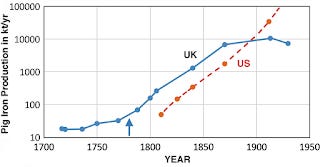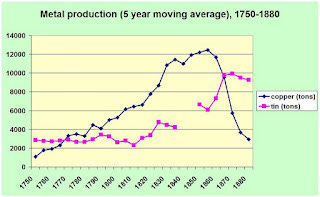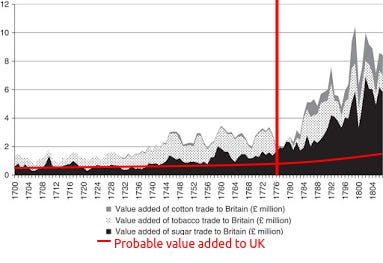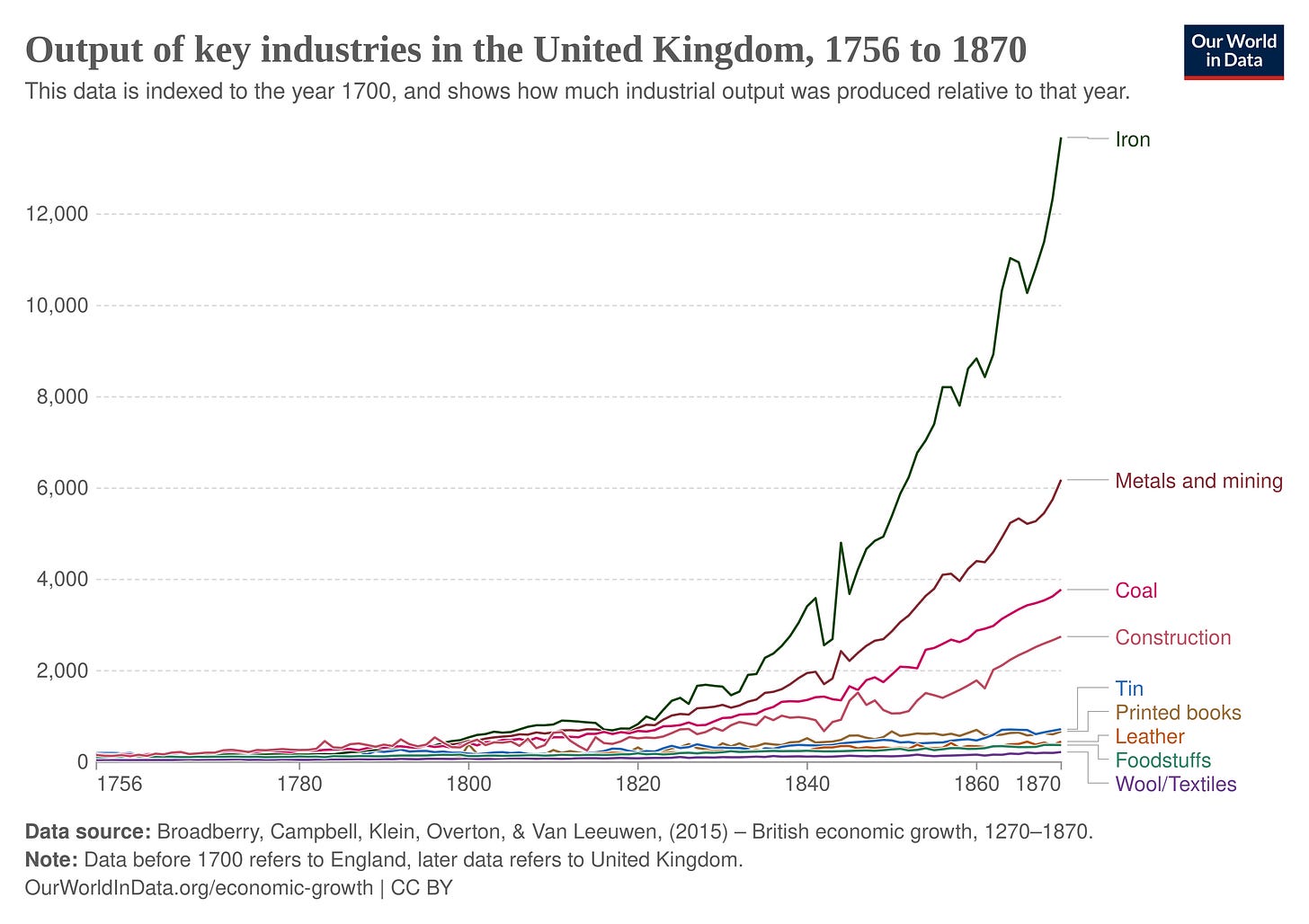It has recently been claimed (Rönnbäck (2018)) that using slaves to grow sugar and cotton was the source of the wealth that powered the Industrial Revolution in Britain. This claim is bizarre because if it were true Brazil or Portugal should have been the home of industrialisation. As will be shown below, the timing of events around the British Industrial Revolution is not consistent with the claim and the scale of imperial trade, whether derived from slaves or not, was surprisingly small.
There is clear evidence that the Industrial Revolution has its roots in the early to mid eighteenth century, before any rise in income from the slaver colonies. The world's first, large iron bridge was built at Ironbridge in 1779 so the mining, casting and forging technology to support such a large commercial project must have been available before this.
Ironbridge UK 1779
UK coal production was growing exponentially from the beginning of the eighteenth century:
Source: Wrigley (2010)
Pig iron production doubled in the first half of the eighteenth century and grew strongly after 1775:
UK Copper production was also climbing steadily at this time:
British manufacturing also had a steeper growth than elsewhere from 1750:
In the first half of the eighteenth century fixed steam engines were being used in Britain for power in pumps etc. The building of canals gets underway from 1750 Bogart et al.
Turnpikes (quality toll roads) begin to be built in quantity after 1730 as shown below:
All of this gives a date of around 1730-1750 for the start of the Industrial Revolution.
There is a postmodern school of thought that the Industrial Revolution in the UK was due to slavery and hence powered by sugar, not coal, metallurgy and ceramics etc. Those who propose this argument add together the maximum possible values for sugar, cotton and tobacco plus all associated trade and the GDP growth due to slavery to suggest that slavery provided a huge boost to UK GDP:
Value added to Imperial GDP % See Rönnbäck, K (2018) below.
However, even with the massaging of data it is difficult to get a figure of more than about 2% of imperial GDP for sugar and cotton until after 1780. Imperial GDP (as shown in the graph above) includes the growth of the home economies of the USA and other colonies at that time so we cannot be looking at more than about 1% contribution to the GDP of the UK from slave plantations. Hence it must be concluded that the very slight benefit to the UK economy derived from slavery occurred at least 30 years after the start of the industrial revolution.
The main beneficiaries of cotton, tobacco and sugar production were the colonists in places like Virginia, especially after 1776.
Notice the boom after 1776, the author did not remove the USA from the data after this date. The USA is erroneously lumped in with the British Empire. This answers the much asked question: "if slavery did not benefit the UK economy why did it happen?". Slavery benefited the slave and plantation owners in the colonies but had little impact on the UK economy.
UK GDP was unaffected by the abolition of slavery, in fact the economy grew strongly after 1826 when slavery was abolished across the Empire :
The Industrial Revolution was powered by coal, not sugar. The beneficiaries of slavery were the slave plantation owners and colonies where they lived, not Britain. On reflection this is blindingly obvious and it could only be the febrile state of modern politics and the media, and the disingenuous academics making careers from this, who would consider slaving, the archetypal economy of the ancient world, to be the power behind the Age of Steam.
Notice in the graph above that Wool/Textiles are a small contributor to the industrial output of the United Kingdom economy. Given that in 1850 about 90% of the economy was domestic (95% in 1750) and undergoing a population, construction and heavy industrial boom this is not surprising.
There is yet more evidence that the slave colonies were not hugely important to British wealth. There is no doubt that Britain was a major trading power in the nineteenth century:
But the distribution of this trade was largely outside of the British Empire:
The share of British GDP that was derived from overseas trade was largely from outside the Empire and not dependent on slave produced products. It was the individual colonists and plantation owners who most benefited from the trade produced by slaves.
What is surprising from this and other analyses of British imperial trading is that the advantage of the British Empire for Britain itself was to project power rather than to enrich Britain directly. Britain was thriving on its own booming domestic market. In 1850 imports and exports combined were only 13% of GDP.
It is clear that the Empire was of little economic value to the UK. This is especially obvious when the end of Empire in the 1960s is considered. UK GDP per capita scarcely changed relative to the US economy:
There is no case for slavery (or the Empire) powering the Industrial Revolution. There is a case for UK global hegemony in the 19th century providing the UK and the globe with relative stability (pax Britannica) and that this orderly and civilised world was necessary for the end of slavery.
Most black people in the UK are not descended from people who were slaves 200 years ago. Only a third of the UK black population comes from the Caribbean and a sizeable proportion of Caribbean black people are descendants of those liberated by the West Africa Squadron and re-settled. It is ironic that perhaps half of the black population of the UK are of Nigerian heritage and hence descendants of those who hunted for the slaves that were sold on the coast. Of course, the reality is that holding these people responsible for the acts of their distant forbears 200 years ago is like blaming Jews for the death of Jesus. It is shocking racism. As is blaming the current British for slavery.
Note 1: The British Empire used its power to conclude treaties globally to prevent slavery (Source: PE Lovejoy. Transformations in Slavery, A History of Slavery in Africa. Cambridge University Press. 2012 )
1807: The Abolition Act prohibits all British subjects from participation in the slave trade as of January 1, 1808. A naval squadron that eventually reaches one-sixth of the total strength of the Royal Navy is dispatched to blockade the West African coast.
1810: Anglo-Portuguese treaty whereby Portugal agrees to restrict its slave trade to its own colonies.
1813: Anglo-Swedish treaty whereby Sweden outlaws the slave trade.
1814: The Treaty of Paris: France and Britain agree that the slave trade is “repugnant to the principles of natural justice.” France agrees to limit its trade to its own colonies and to abolish the trade in five years.
1814: Anglo-Netherlands treaty whereby the latter outlaws the slave trade.
1814: Anglo-Spanish treaty whereby Spain limits its slave trade to its own colonies and prohibits the trade north of the equator after 1817 and south of the equator after 1820 in return for £400,000 in compensation.
1815: Anglo-Portuguese treaty whereby Portugal agrees to limit its slave trade to its possessions south of the equator. In return, Britain waives Portugal’s war debt of £450,000.
1817: British convention with Portugal limits the Portuguese slave trade in East Africa to an area from Cape Delgado to the Bay of Lourenco Marques. Portugal also concedes visit-and-search rights on Portuguese ships suspected of violating this and other agreements.
1817: British treaty with Imerina prohibits the export of slaves from Madagascar in return for compensation of £2,000 per year. Imerina outlaws slave raiding in the Comoro Islands on penalty of being reduced to slavery.
1817: Anglo-Spanish treaty grants Britain the right to detain Spanish ships.
1820: British treaty with Imerina is extended.
1822: Moresby Treaty between Britain and Muscat prohibits the export of slaves by Europeans in East Africa and establishes a British observer at Zanzibar. Britain recognizes Omani claims in East Africa, including the existence of slavery.
1823: A third treaty with Imerina whereby Britain is authorized to seize slavers; it also provides for the resettlement of liberated slaves.
1824: Establishment of British protectorate over Mombasa with intention to restrict slave trade; protectorate terminates in 1826 under Zanzibar pressure.
1825: Hugh Clapperton and Dixon Denham negotiate treaties with the Sokoto Caliphate and Borno to end slave exports in return for trade in European goods.
1826: Newly independent Brazil accepts Portugal’s treaty obligations with Britain and promises to abolish the slave trade in three years.
1831: Anglo-French treaty provides for mutual, limited right to search vessels suspected of carrying slaves.
1833: Britain emancipates slaves in its West Indian colonies, South Africa, and Mauritius, with compensation to slave owners; emancipation takes effect on August 1, 1834, although a system of apprenticeship lasts for four years in some colonies.
1835: Anglo-Spanish treaty for condemnation of slave ships.
1838: Thomas F. Buxton launches a campaign against slavery, advocating free trade and the colonization of the African interior with freed, Christian slaves. Buxton’s efforts result in the strengthening of the British naval squadron off the West African coast and the signing of antislave trade treaties with African states.
1839: Convention between Oman (Zanzibar) and Britain, which extends rights of search and seizure.
1841: Britain, France, Austria, Prussia, and Russia agree to extend rights of search and seizure to halt the slave trade, although France refuses to ratify the treaty.
1842: Webster-Ashburton Treaty: Britain and the United States agree to maintain a naval force of at least eighty guns off the African coast as part of a joint commitment to suppress the slave trade.
1844: Britain signs treaty with Sultanate of Anjouin (Comoro Islands) to prevent French recruitment of labor.
1845: Anglo-French treaty: Both powers agree to maintain at least twenty-six cruisers off the African coast as an antislave-trade force; rights of search and seizure are abrogated. France does not adhere to the treaty, which is allowed to expire after ten years.
1845: British treaty with Oman (Zanzibar): Slave trade is restricted to Oman’s possessions in Arabia and East Africa; Britain secures the right of search and seizure.
1846: Tunisia abolishes the slave trade to gain British support against the Ottoman Empire.
1851: Anglo-Persian treaty grants Britain right of search and seizure.
1855: First of several treaties with principalities on the Red Sea coast that grant right of search and seizure to Britain; official appointed to Berbera.
1862: Treaty of Washington: The United States grants Britain the right of search and seizure.
1865: British treaty with Imerina whereby Imerina prohibits the importation of slaves.
1875: British treaty with Tunisia confirming abolition of slavery and the slave trade. Annexation subsequently revoked.
1877: Anglo-Egyptian treaty prohibits the import, export, and transit of slaves in Egypt; domestic slavery to be outlawed by 1884 in Egypt and 1889 in the Nilotic Sudan.
1880: Anglo-Ottoman Convention reaffirms the prohibition of the slave trade and grants Britain rights of search.
1884: British treaty with Ethiopia grants Ethiopia access to the Red Sea through Massawa on a condition that slave trade ends in the interior.
1885: Berlin Conference: Britain, France, Austria, Germany, Russia, Spain, Portugal, Holland, Belgium, Italy, the Ottoman Empire, Sweden, Denmark, and the United States agree to “help in suppressing slavery,” although no direct measures are taken against the slave trade in Africa.
1889: Zanzibar grants the British and Germans perpetual right of search, decrees that new slaves entering its domains after November 1, 1889 shall be free, and provides for the emancipation of all slave children born after January 1, 1890.
1889: Brussels Conference: The participants of the Berlin Conference, plus Persia, Zanzibar, and the Congo Free State, condemn slavery and the slave trade. Bureaux are established in Brussels and Zanzibar to collate and disseminate information on the slave trade.
1900: Britain abolishes the legal status of slavery in the occupied parts of Nigeria with the intention of extending the decree throughout Nigeria.
References
Eltis, David and Engerman, Stanley L., ‘The importance of slavery and the slave trade to industrializing Britain’, Journal of Economic History, 60, 1, 2000
Wrigley, EA (2010), Energy and the English industrial revolution, Cambridge University Press.
Opening Pandora’s box: A new look at the industrial revolution. Tony Wrigley 22 July 2011 Vox-EU
Eltis et al (2005). Slave prices, the African slave trade, and productivity in the Caribbean, 1674–1807. Economic History Review, 58,4 pp673-700
Rönnbäck, K (2018). On the economic importance of the slave plantation complex to the British economy during the eighteenth century: a value-added approach. Journal of Global History, Volume 13, Issue 3. November 2018 , pp. 309-327
This has figures that include the USA as part of Britain:
"Another way of measuring the magnitude of these activities is therefore to analyse the aggregate economic values involved in the transnational value-chains related to the Triangular Trade and the American plantation complex, including all factor incomes and not just profits. It is this approach that will be used in this article."
















Sorry that the UK now must deal with the thesis that all western wealth was a product of slavery. In the US that was promoted by the 1619 book that our very foundations were built on slavery. The US constitutions used the 3/5th compromise for citizen counting but an odd clause required ending importation of slaves by 1808. Some of the first acts of the US navy were to attack pirates and slave runners likely in conjunction with the British navy.
It appears that white guilt was subsiding so must be rebuilt for our modern world. Can understand why the divisions are a solid US tactic, nut not for the UK.